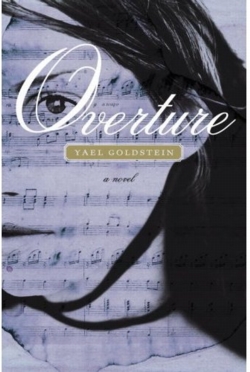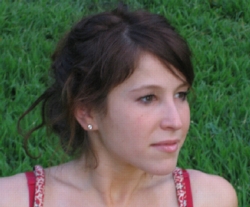 June 07
June 07
Mothers, Daughters, and the Word: Talking with Yael Goldstein
Miriam Cohen

With book jackets prominently displaying Chagall prints and faded black and white photos of Holocaust-era Poland, many of today’s up-and-coming Jewish American writers are gently chiding their cynical literary forbearers. In lieu of writing about shame or assimilation, they have embraced a Jewish literature that leans closer and closer to a kind of literature of the shtetl, a genre gleaning its material almost exclusively from large scale Jewish tragedy.
But not all authors are following in this well-trod path lain with the possibility of awards, acclaim, and – most valuable for a first-time novelist – an audience.
Yael Goldstein’s Overture is indeed a novel that might appear conspicuously Jewish along the aisle of Barnes and Noble. For one thing, its jacket blurbs include praise from Jonathan Rosen and Rachel Kadish. For another, as most readers aware of the Jewish literary landscape will know, Yael Goldstein’s mother is the writer Rebecca Goldstein.
All signs point to “Jewish” in the novel itself as well, but Goldstein unexpectedly pulls a curious trick: The Jews in Overture are so assimilated that belonging or not belonging to the Tribe doesn’t even so much as chafe their radars.
Overture is primarily the story of Tasha Darsky, a world famous and critically acclaimed violinist hailed for the raw sexuality of her music. But while the novel is rooted in both musicality and notions of talent and art, the crux of her story lies in Tasha’s relationship with her daughter. Alex is a prodigiously talented pianist and composer, and their shared musical gifts result in duets that sell out concert halls. When Alex enters adolescence, the chord that connects them begins to wear thin, and she yearns for independence as an artist.
In a potent scene towards the end of the novel Alex wails: “It sucks, actually. You have no idea how much it sucks being the daughter of Tasha Darsky…And I know that’s a mean thing to say. I know you love me, and you try hard, I know you try very hard, but it’s true. It’s not you’re fault. You’re not human; you’re, you’re omnipresent. I don’t think there’s anywhere I can go to take a break.” A few paragraphs later she muses: “I wonder what the point is of being the secondary Darsky?”
The autobiographical school of literary critics, or the Freudians, or the Deconstructionists, or whatever they’re calling themselves these days, would have a field day with this character: At first read, Alex appears to be a rather transparent stand-in for Goldstein herself. After all, the novel is about a famous artist and her talented daughter’s struggle to assert her own autonomy as an artist outside of her mother’s rather all-encompassing shadow. Not to hammer this point to death, but if this review were a B-film, right about here is where Twilight Zone music would begin to swell: Might this un-Jewish novel be a very Jewish rebellion against a mother who raised her children Orthodox without believing in it, and yet whose own body of work is primarily Jewish?
“If anything, I kind of wish I could write a more Jewish novel. But for some reason my imagination doesn’t go in that direction,” Goldstein says when asked about this issue.
This stance is unusual considering the fiction produced by Orthodox and formerly Orthodox Jews. One doesn’t easily forget Wendy Shalit’s 2005 New York Times Book Review essay “The Observant Reader” in which she essentially attacks authors such as Tova Mirvis and Nathan Englander for “exposing” the Orthodox world in an unsavory light. If the authors Shalit has railed against are any indicator, fiction focusing on Orthodox Judaism is by definition fraught with an element of bitterness or a glimmer of what it feels like to be an outsider in an insiders’ world.
 While Goldstein says that she grew up feeling that her family was ostracized from her Highland Park Jewish community, she is refreshingly free of resentment towards the Orthodox world in which she came of age, and which, by all accounts, she seamlessly left behind as a Harvard undergrad.
While Goldstein says that she grew up feeling that her family was ostracized from her Highland Park Jewish community, she is refreshingly free of resentment towards the Orthodox world in which she came of age, and which, by all accounts, she seamlessly left behind as a Harvard undergrad.
The question of autobiographical content in this novel, though it may be an overdone line to tread, is essentially unavoidable. Goldstein herself brings the issue to the table on her dedication page, thanking “Rebecca Goldstein who continues to inspire me by accomplishing the seemingly impossible every day: being a better mother because of her art, and a better artist because of her consummate mothering.”
Goldstein laughs when the question of Overture’s autobiographical content is inevitably raised. “Interestingly, my mother’s relationship with me is nothing like this. First of all, Tasha is nothing like my mother. She’s this incredibly ambitious, incredibly driven woman. My mother’s ambitious, but not like that. Over and above, I think my mother was a significantly better mother than Tasha was. Alex always feels overshadowed, sort of overwhelmed by her mother. I certainly never felt overshadowed. My mother’s one of those mothers who makes you think her whole life is just to make you happy. And, man, that helps to give you a good sense of self.”
And it does seem that Goldstein has a secure sense of self as a famous writer’s daughter –and as a writer in her own right. She is cheerfully candid in detailing the nuances of her relationship with her mother, fielding questions of a much more personal nature than most first-time novelists are confronted with.
“I prefer that people ask, because I don’t want people to assume. That would be sort of irritating. If people ask, that’s fine; then I can just tell them no [it’s not autobiographical]. Of course it’s just obvious whenever you read a book and it seems to parallel in some ways the author’s life, you’ve got to wonder, you know, to what extent,” Goldstein says, firmly drawing the line between herself and her mother.
The starkest line drawn is the resolute absence of Jewishness in the novel. Overture is about Art, and Goldstein doesn’t allow her focus to waver. In one of the scant sections that turns a peripheral lens toward Judaism, Tasha describes a childhood understanding of her heritage as “a picture of the world in which God’s Chosen People are a group consisting of great painters, certain avant-garde composers, and a handful of writers.”
Here, Goldstein admits to recycling some autobiographical materiel from her own life. She describes growing up with physicist father Sheldon Goldstein, who “very much believes in this one interpretation of quantum mechanics and everyone who doesn’t is evil.” Like Tasha, Goldstein assumed that in a world hued in black and white, with wrong and right people, those sanctioned as right must logically be the Chosen People. “I think Tasha’s obsession with mattering arises out of this,” says Goldstein. “At least, the form it took was very Jewish…and yeah maybe other than that there isn’t much else.”
But what is Jewish about Overture may be found between the lines in the swelling echoes of the cacophonous orchestras for which Goldstein has found a verbal language.
The third part of this five-part novel shifts its center to Poland, where Tasha has a brief affair with the legendary Polish filmmaker Aleksander Pasek. The result of the affair is Alex: a hybrid of two substantial talents. Refreshingly (or blasphemously), Tasha’s reaction to Krakow does not follow the prescribed edict for the modern Jew in Poland. “Poland is so different from how I imagined,” she marvels. “I expected it to be drab but Krakow is one of the most colorful cities I’ve ever visited.”
Aleksander, who is considerably older than Tasha, presents a compellingly realistic portrait of a Holocaust survivor who never much cared for things Jewish; a Jew who continues, post-Holocaust, to view Poland as home.
Jewish American writers love to pull out sympathetic martyrs, but Aleksander is difficult to endure. Unprompted, he tells Tasha: “What I mean to say is that when the Nazis came to power we hardly considered ourselves Jews. My grandfather, you understand, had been the chief rabbi of Krakow, and his father before him, but we…” And here Goldstein treats her prose like a painting, allowing negative space to create what the brush cannot.
The hyphenated label of “Jewish American author” is a serious pigeonhole to reckon with, but the term may be more fluid than the way some Jewish organizations or schools of thought define it. While D.H Lawrence once advised “Never trust the artist. Trust the tale,” this artist and her tale are inextricably linked.
“In some ways I think of it as a book that had to arise out of my Jewish psychology. I feel like my own Jewishness...” Goldstein pauses, and then begins again. “I see it all over the book. I grew up Orthodox. I’m not anymore. I’m not really connected anymore and I also have no unresolved feelings of anger, you know, or hatred. I feel good with Judaism. I like the way I was brought up I respect the people who stay in it, but I don’t want to be in it anymore. So yeah, I mean there’s not so much artistic angst to draw on,” she says, a bit of wistfulness creeping into her voice. “Maybe one day. Maybe when I have kids then this issue will become big for me again… Maybe then my great Jewish novel will arise.”
For Benjamin David’s review of Haim Watzman’s A Crack in the Earth click here.
Miriam Cohen is an intern at Zeek, works as a freelance writer, and lives in New York City.








